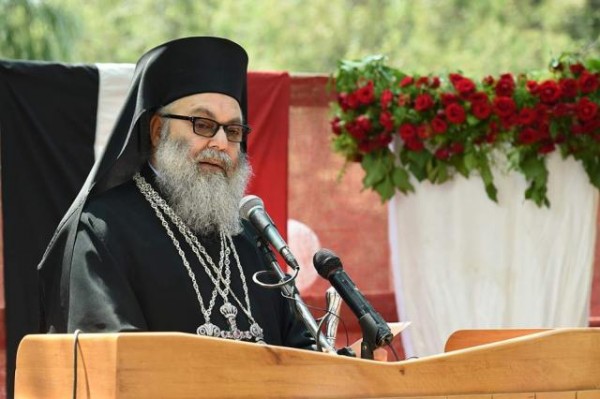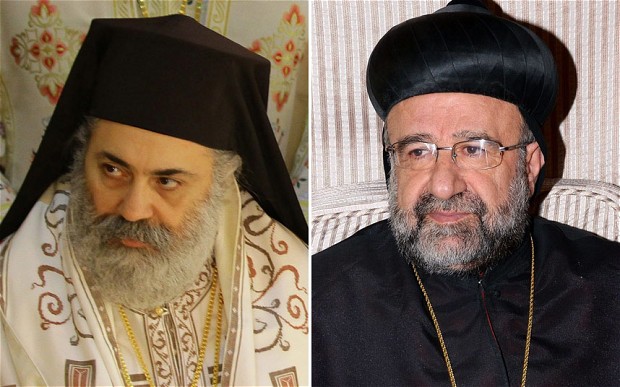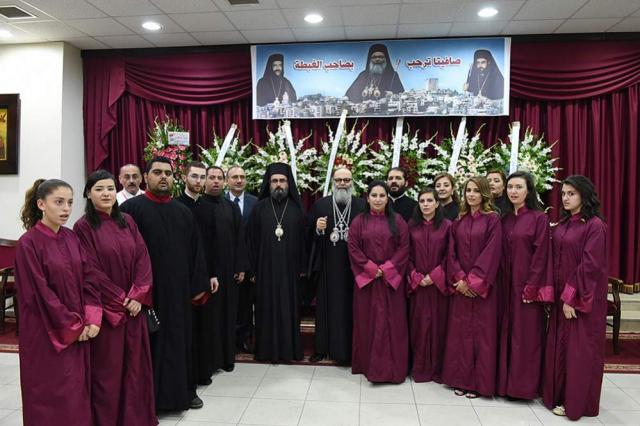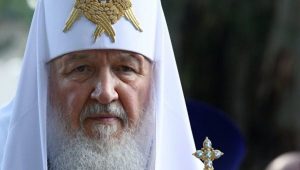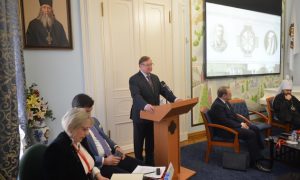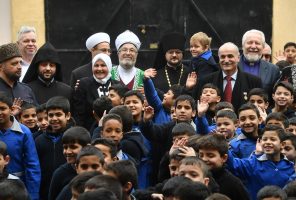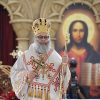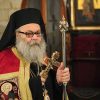English translation of an interview published by the Patriarchate of Antioch on October 4, 2014:
What role does the Antiochian Orthodox Church play as a part of the social fabric of Syria? What has it done and what will it do?
To start, we would like to direct our warmest greetings to the Syrian people as a whole and our Muslim brothers in particular on the occasion of Eid el-Adha. Many happy returns.
The Patriarchate and our Orthodox Christian people are a fundamental part of our country. We are Syrians, the children of this nation. We were born here, as were our fathers and grandfathers. Christianity started out here and we feel that we are one family with all the country’s communities. Throughout history, the Patriarchate has been—and we hope it shall remain—a fundamental factor for common life in dignity, for reinforcing all the national and historical foundations that have brought us together ever since Christianity appeared in these lands. Ever since the coming of Islam, we have lived together and have built a common history. There is no doubt that our future is one.
From your following the situation and on several levels, is there anything new in the case of the two kidnapped bishops?
Unfortunately, there is no certain news about our brother bishops. There is much hearsay and many stories. Our prayer for them is that they and all those who have been kidnapped throughout the world are in peace and health of body. We hope that they will be released soon and be among us. Now, after almost a year and a half, amidst this total blackout, it is causing us to wonder and to address the international community, governments, organizations, international bodies, all of them, all concerned parties: where are the slogans about human rights when it comes to the complete indifference to dealing with this issue, this total silence? Most of the accounts and reports that reach us are baseless. It’s like the expression, “It is as though the earth opened up and swallowed them.” Nevertheless, there is no doubt that we are following up on the issue with concerned parties without despair and with all persistence.
If they wanted to use the bishops’ kidnapping as a tool for fragmenting and dividing the region, if some think that the issue of Christians is one of the tools they can use to arrive at particular goals, and if they thought that through this case they could nurture a means for terrifying and intimidating Christians, we say to them: despite the difficulty of the circumstances and despite the bitterness of these days, they are completely wrong because this will not intimidate us and it will not force us to change our opinion or cause us to renounce any right that we hold. We as Christians live beside our Muslim brothers in these lands. Nothing separates us from them.
here have been more than fourteen centuries of brotherly coexistence between the various communities in the region and over the course of history nothing like the current crisis has swept through the region. Does this exceptional situation not call for exceptional measures?
All of us are mobilized to protect our land, our honor and our dignity in this country. We will all either stand together or fall together. Today they ask me, “Your Beatitude, what is your opinion about ‘the defense of Christians?’” In truth, this expression is new to our ears. We are always surprised when it is discussed. We have lived one history and have built a shared culture. We have one future. Perhaps over history we have differed, as a single family differs among itself. But the family remains one. When the late Fares al-Khoury was asked about “the protection of Christians”, he quickly took to the pulpit of the Umayyad Mosque and said, “As a Christian member of parliament, I reject French or English protection and I ask the protection of my brothers who are praying with me in this mosque.” This is our history and this is what we continue to affirm always. There are many people with other goals who are trying to spread other ideas, but adversity brings forth real men and we are not afraid.
We as the Patriarchate of Antioch are deeply rooted in this land. The Maryamiyya Church, which is nearby to us here and hundreds of years old, bears witness to the authenticity and long history of co-existence between Christians and Muslims, of our living together with each other.
As regards the thinking in our sermons, our writings, our talks and in our meetings at home and abroad—in the West, in America and Russia—with churches and other organizations, we first of all make this truth clear. It is very important to make others know the truth of what is happening and not to leave it to the deception of the misleading media. This is not just transmitting an accurate image—it is transmitting the situation on the ground. We are not satisfied with thinking and theorizing. We are trying as much as possible to be at our people’s side. We console them, strengthen them, assist them, even with matters of daily life, not only in terms of moral support. Consolation has many shapes and forms. It can be spiritual, psychological, material and so forth. It pleases me to say that we as a Patriarchate are helping everyone, Muslims and Christians, materially and humanitarianly, without asking for their name, through the Department of Relations at the Patriarchate, which is concerned with endowments, financial, spiritual, pastoral and ecclesiastical issues and issues of aid and assistance. Each type of activity has a department concerned with it.
You refrained from personally participating in the conference “In Defense of Christians”, contrary to the position of the other patriarchs. What is your perspective? What message did you want to send to the public through your choosing not to be present?
This is an important and delicate question. There is a note worth mentioning, my refraining from personally attending a conference entitled “In Defense of Christians”. We do not go somewhere so that Christians will be defended in Syria. We have already spoken about this in principle. Likewise, the information that we and others concerned with the issue had in our possession indicated a great deal of ambiguity and lack of clarity in terms of the aims and title of the gathering, what would result from it, and what message would be demanded in it. All these questions led us to refrain from attending in person and to ask our brother Metropolitan Joseph Zahlawi, who is originally from Damascus. He is our church’s metropolitan in America and we asked him to represent us. This is a very important message, because when we want to talk about the Christians in the Middle East—in Syria, in Lebanon, in the region—then we are directly concerned and the matter is not in other people’s hands. We will not be like pupils who go into a classroom to listen to lessons told to them. We cannot be in that position.
There are those who are intentionally attempting to cause the children of Syria in general to think of emigration and leaving the country through terroristic practices in specific regions, Maaloula for example. What is the role that the Church is playing to encourage the children of the nation to hold even more firmly to their land and their nation and to put a stop to such ideas, especially among the youth?
We always call to stay and stand firm in our land. Our homes and families are here. We encourage everyone, despite the hard life and difficult circumstances that we are going through, we always urge and encourage people to stay in this land. It pleases me to mention that two days ago we attended the high school graduation of those who received their diploma last year from the al-Assyea School, which belongs to the Patriarchate. Meeting with them left a profound effect within me—around forty or fifty students attended their graduation ceremony along with their families—especially the smiles on their faces and the atmosphere that they created. I mentioned to them that today we are sending a message to the whole world that we are staying. Despite all the darkness around us, through your presence, your joy and your celebration you are piercing the walls of darkness. This event is a point of light that demonstrates how attached we are to our land.
At the same time, we as a church are trying to help the youth in a practical manner, materially and economically, to the best of our abilities which, in the end, remain limited. Likewise, we are trying to create opportunities for work, which helps the youth to be tied to their country and lessens their suffering. So we are optimistic.
We are constantly holding meetings with the youth. Our churches are open and every church has a hall for gatherings of brotherhoods, women’s groups, youth, girls, Sunday schools and Christian education. These activities are sometimes reduced as a result of the circumstances, but they are present and ongoing.
Last August, I made a visit to the Valley and we have many churches in that region—in the Valley, Safayta, Kafarin and elsewhere. We stayed for an entire month, going from one village to another, from one church to another. We met with great and small, young and old, men and women, Muslims and Christians in the presence of the sheikhs of the mosques and the children of the village. The goal of this activity was to be at the side of our people, to press them to have hope and not to sink under these difficult days we are experiencing, but rather to make it through them.
Is there coordination between spiritual leaders and moderate Islamic scholars in order to confront the distortion in the beliefs of the general public, the consequences of which float to the surface in the form of scenes of decapitation and dismemberment? Is there an initiative to hold conferences on a Middle Eastern level in order to make practical plans for confronting this?
Of course there is common Christian-Muslim work to arrive at sound faith. These scenes reflect a lack of conscience and human consciousness. We do not connect them to religion because they are totally removed from it. When it happens in God’s name, it is the most extreme form of perversion. As we have mentioned, we children of this country know perfectly well what true, tolerant Islam is and who our Muslim brothers are. This is also what they are saying themselves. We always convey this image to the West. They know about Islam theoretically while we live here. Without a doubt, this is a distortion of religion.
During these honorable days, we are living in the commemoration of the sacrifice of the Patriarch Abraham, when offerings and sacrifices express faith in the Lord, your humility before Him and that you have submitted yourself to Him. Then, you distribute the sacrifices to poor and needy people so that they can eat it. You do not send them up to heaven. This means that when we say of a Muslim that he is devout and celebrates Eid al-Adha, we mean the following: he offers a sacrifice to God as an expression of his faith in Him and his submission to Him. This faith draws you closer to your fellow man. He gives it in the end to his fellow man, to the poor and needy, so that he can eat meat when he had not been able to. So there is no religion and no humanitarian principle that accepts what is happening, especially, unfortunately, under the banner of religion. This is rejected by Muslims and Christians. As a result of blind extremism, we have started using the word “moderates”. Afterwards, events will have forced upon us a whole new dictionary. In any case, we cooperate, meet and stay in contact with each other, with the Grand Mufti Ahmad Badreddin Hassoun, to whom we are bound by brotherhood. His house is our house and our house is his house. We are one with our brothers, the virtuous and tolerant Islamic scholars, even in the Arab world, such as the Grand Sheikh of al-Azhar and all those in whom there is God’s law, any person in whom his conscience and God’s law is at work. Everyone rejects extremism, as believers in the Lord in Syria and the region. However, it has become clear that politics is what is behind these extremisms, not religion. We hope that people will open their hearts to God and be guided by Him. We hope that when a person holds a sword, says “Allahu Akbar” and slaughters his brother like he would slaughter a chicken, he knows where he is and where he is headed.
Many conferences and meetings have been held in Syria, Lebanon and elsewhere and we have participated in some of them, on the local, regional or international level. We always leave with the agreement of everyone without exception, Muslim and Christian, that in order for one to renounce extremism and not accept it, one must hear the voice of truth and the truth must be said and this position must be declared to states and international organizations. There has been more than one conference at the World Council of Churches in Geneva. These conferences did not have a political character. They were humanitarian and churchly meetings that adopt human rights.
It has frequently been said that confronting extremist organizations like ISIS and its sisters requires first of all an opposing ideology. What is your opinion of this idea?
We cannot characterize this as being religious. As far as what is said of “The Islamic State in Iraq and Syria”, everyone, Muslims included, reject this kind of talk in practice. We hope that the countries and organizations concerned with this issue will halt the sources for funding ISIS and similar groups, that they will stop sending arms to these organizations and cease their moral and logistical support for them. If they are serious about their effort to put an end to the spirit of extremism, they must end material, military and logistical support for them. This is the message I am conveying. After that, they can leave the rest to us.
As regards ideology, I would like to make clear that what’s new for us is old. These national and religious constants that we have experienced in this country brought to my mind what happened in 1919, when an international commission was sent to Syria by the League of Nations in order to give the Christians a choice, on the basis of human rights, between a French or English mandate. The meeting was here in the Patriarchate, in the presence of the late Patriarch Gregory IV. They asked him then, “Which do you choose, Your Beatitude, the French or the English mandate?” He responded, “I choose the national mandate. I choose my brother and the son of this country. This is the mandate that I want…” So what we want to say is what’s new is old. It is not old in the sense of being outdated, but rather it is the authentic truth that is thousands of years old and engraved upon our hearts. We were nourished with it from our mothers’ breasts. Muslims and Christians together, we hold fast to it. This ancient truth is like aged wine; the more it ages, the more substantial it becomes.
These channels that transmit sectarianism were put into place very carefully, through a premeditated media campaign. Do we not need today media programs and plans to counter it, that would work to spread awareness and bring up a new generation that is immune to it and believes in national brotherhood in word and deed? What is your role in producing this sort of content?
Media and communications play a fundamental role. Here in Syria, the media is active and has come to have a major role. Is not our meeting proof of this? We are in constant cooperation, dialogue and interaction with the major media. As a Church institution, we affirm the role of media. For us, Church media is a national media. As we mentioned to you before, we visited Wadi al-Nasara for almost a month. During that time, I said to my loved ones: I did not come here for prayer alone. I cannot shrink my purpose for this visit and limit it to prayer alone. I can perform my religious duty in the Maryamiyya Church, no more than thirty seconds walk from me. You do your prayers and open your heart to the Creator of the Universe, the Lord of Heaven and Earth, so that he can put you into partnership with your fellow man. You are at a national event, not only a spiritual event. And so the visit is a churchly visit in its form—a patriarch visiting his church, his flock and his churches in the Valley. However, it is a national event in the fullest sense of the word. It was covered by all the media. We as the Church of Antioch have a website for the Patriarchate that aims to publish all the news of the Patriarchate and to be in contact with all those who want to get to know the Church, her history and her activities. We have a page on Facebook and there is a 24-hour radio station on the site of the Patriarchate. Of course, we use all these modern means of communication and harness them to transmit the truth.
A final word from His Beatitude the Patriarch:
We must very much pay attention to the issue of language and its use. This person says “I am a Muslim” and that person says “I am a Christian.” Some time ago, we were passing near Arwad Island in Tartus. I said, “Look at Arwad Island. During the days of French colonialism they turned it into a prison and threw into it all the heroic citizens who worked for independence, from all communities without exception. We read about Fares al-Khoury and Shoukri al-Quwatli. No one writes of them that they were Muslims or Christians. Rather, in history they are mentioned as being Syrians…”
This interview was conducted by Hani Naqshbandi and Maysoun Haddad.












